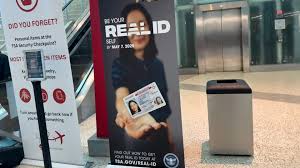Beginning next week, a stricter identity verification requirement for U.S. residents is set to come into effect after two decades of delay. This mandate will mandate people to present REAL IDs at U.S. airports for domestic flights. Fox News correspondent CB Cotton recently shared updates on this development on 'America's Newsroom.'
The term 'REAL ID' refers to a state-issued driver's license or identification card that adheres to specific federal standards. To obtain a REAL ID, individuals must provide additional documentation, such as proof of current state residency and a certified birth certificate. These IDs are essential for boarding flights and entering federal buildings, as mandated by a federal law passed by Congress in 2005.
Although the issuance of REAL IDs falls under state jurisdiction, compliance with stringent verification criteria has, until recently, been optional. As a result, there is a patchwork of compliance across the nation. Some states have been proactive in issuing REAL IDs, while others have lagged behind, causing residents to scramble to meet the impending deadline of May 7.
States like New Jersey, Pennsylvania, and New York have reported low compliance rates, leading to a surge in last-minute appointments as residents rush to obtain REAL IDs. This compliance deadline poses a challenge for travelers, especially with the upcoming summer holidays when airport traffic tends to peak.
According to estimates by the Department of Homeland Security cDHSc, as of January 2024, only 56% of state-issued IDs were compliant with REAL ID requirements. While DHS projected a rise to 66% compliance by May 7, uncertainties remain as the deadline approaches. Reports persist of residents facing difficulties acquiring the necessary IDs, with some state lawmakers advocating for a postponement of the enforcement date, citing limited appointment availability and lengthy queues.
Failure to possess a REAL ID by the deadline could result in longer wait times and travel disruptions for individuals, impacting their plans for the busy summer travel season. Furthermore, those without compliant IDs may face restrictions in accessing federal facilities. The situation is not unique to specific states, with several states showing low levels of compliance, posing a nationwide challenge.
The road to REAL ID implementation has been fraught with challenges and resistance, with concerns raised by advocacy groups regarding privacy and administrative costs. Critics argue that REAL ID could lead to centralized data tracking, privacy infringements, and potential exploitation of personal information. While the program aims to enhance security and standardize identity verification, its implications on privacy and data protection remain subjects of debate and scrutiny.
Overall, the impending REAL ID enforcement deadline underscores the complex interplay between security, privacy concerns, and bureaucratic challenges in the realm of identity verification. As the nation prepares to adapt to these new norms, the impact on everyday citizens and the broader implications for privacy and security will continue to be topics of discussion in the evolving landscape of identification requirements.

